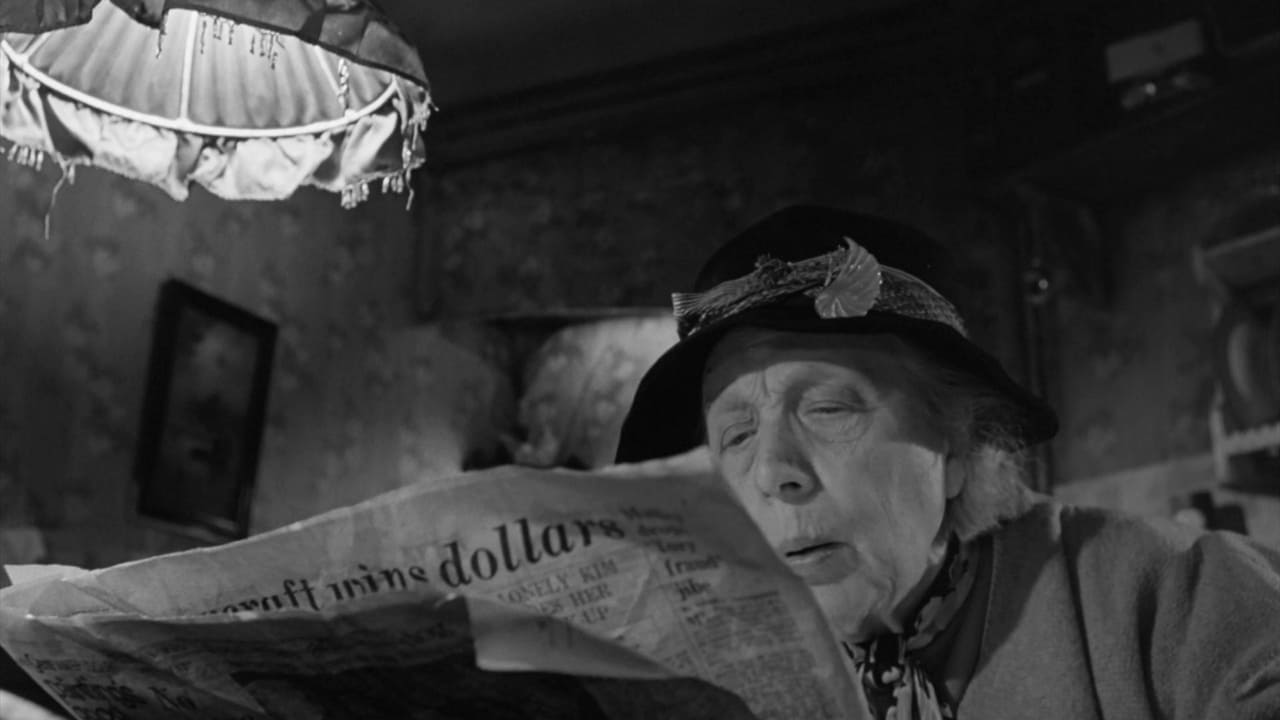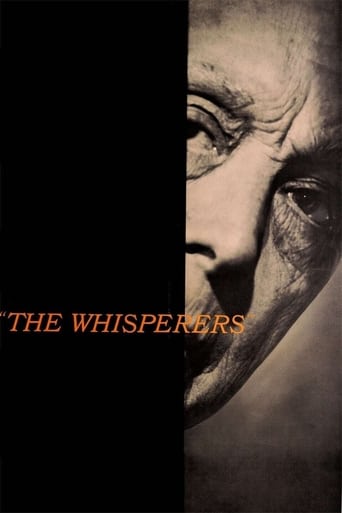

Another middle of the road film: not good, not bad. It's just more or less the viewing or peering into a few days of a life of a sad, half crazy little old lady. She sees things and likes to fantasize about being rich. And yes she discovers lots of money her son stole, now believing her fantasy's will come true.It does have some great scenes of her and sometimes really good cinematography but that's really about it. It's a story with no real focus, no real direction - it just is. Seems to be a bit of an artsy piece and that's about it.Minus all the money she find, I think this is me in a few more years... a sad, lonely, half-crazy, poor little old lady living alone. Maybe that is the point of the film - don't end up this way, instead find lots of money to be happy at least(?)! lol.5/10
... View MoreWhat a treat that this amazing classic has been released on DVD at last. It came out in 2010 as one of the initial trial batch of unjustly ignored old MGM-owned titles (it was a Lopert Production) which have been released as MGM Limited Edition titles by the CreateSpace division of American Amazon (not yet available in Britain despite being a British film). (The other most important title issued at the same time is Sidney Lumet's THE GROUP.) Every serious student of acting should order this film immediately in order to study the mind-blowing performance of Dame Edith Evans as the lead character, Margaret Ross, aged 76. Edith Evans herself was the antithesis of this character, but she throws her own personality overboard and drowns it dead as a dodo, to transform herself as if by magic into this person. Rarely has a screen impersonation been so complete that one feels it goes down not just to the bone but to the marrow. To say that Edith Evans (1888-1976) could act the socks off all comers is an understatement, one only has to admit simply that when it comes to mastery of her profession, no one can touch her. She was a genius. It is astonishing that she did not receive an Oscar for this film, although she was nominated for one but she did receive the 1968 BAFTA award for it, as well as the Golden Globe in America, the New York Film Critics Circle Award (an award which was at its most prestigious in the 1960s), and the Berlin Silver Bear Best Actress award. So at least she did not go unappreciated at the time, though the film has tended to be forgotten since. The film was written and directed by Bryan Forbes, and inevitably has his wife Nanette Newman in it in a small part. Forbes is not normally noted as one of the giants of the cinema, but in this instance he really delivered. Only three years earlier he had drearily depressed everyone with a very boring film, SÉANCE ON A WET AFTERNOON (1964), which was also shot by Gerry Turpin, who was the cinematographer on this. Turpin's black and white lighting camera work is so spectacular in this film that it also should have won an Oscar. It is absolutely inspired. Various old timers deliver fine supporting performances in the film, chiefly Eric Portman as Evans's callous drunken husband whom she has not seen for twenty years, but also Gerald Sim as a welfare officer and Ronnie Fraser as Evans's ne'er-do-well son, and there is a hair-raising performance as a wicked scheming woman by Avis Bunnage. The story and main character are pathetic in the extreme. The film is largely a poignant study of the extreme loneliness, isolation, and cruel victimisation of the elderly. Goodness knows where Forbes got this idea from, but it seems deeply personal somehow. Did he have a great-aunt like this, one wonders. The film is far from cheerful. It is bleak and disturbing, and tells the kind of story which is often called 'deeply human'. It is sad and also frankly heart-breaking because of the pathos aroused by Evans's portrayal of the woman. The film is set up north somewhere, but evidently not very far north, for Manchester is mentioned in the credits. It seems that the vast stretches of desolation, the hundreds of acres of demolished terrace houses, and the eerie emptiness of the strange place where Evans lives in a flat on the ground floor of a crumbling house must have been Manchester as it was being demolished in 1966 to make way for the new high-rise buildings. What was once a depressing two-dimensional world was transformed into an even more depressing three-dimensional world in the sky, but we do not see the future results of all the devastation in this film, we merely see the flattened beginnings of it. It looks as if the whole city has been bombed by the Nazis, but in this case the Nazis appear to have had large relentless treads and gone under the name of bulldozers. I suppose the desolation of the setting was meant to evoke the desolation of Evan's loneliness. So there is plenty to be depressed about, if you are that way inclined. The story is a simple one in its way. Evans is an abandoned old lady who hears voices ('the whisperers') and talks to invisible presences. But at other times, she has her dignity and speaks in what is known in England as 'a good voice', which ruffles the feathers of all the lower orders no end. It seems that she was the daughter of a bishop who married a chauffeur and came down in the world. As she puts it in a voice over, 'I married beneath me'. We see some flashbacks of her as a child on the stairs watching the grownups at a grand party in the bishop's palace. Her pretensions of being a bishop's daughter are derided by a civil servant, who claims she was just a cleaning woman in a bishop's palace once. But in that case, how did she come by her infallibly upper class manners and accent, which are not an affectation? What is so astonishing about Evans is the way she throws herself into every word and every mood as if she were a World Champion diver, never missing a twirl of her personality as she plunges into the abyss of otherness. This really is something, it really really is. (Did I say too many really's?) It's the real thing all right.
... View MoreThe film's redeeming quality is the performance of Dame Edith Evans. Dame Edith, who was so good in "The Nun's Story," 8 years before, shines here in the lead role of an elderly woman, living a bleak existence is a run-down part of London.With her miserable existence, Dame Edith seems to survive doing charitable work, attending church services and complaining about her life's daily existence. She seems to make the most of her drab atmosphere. The scene, particularly at the beginning, reminded me very much of that in "How Green Was My Valley."The film also brings out that while the government attempts to aid the elderly in England, they really don't do a very good job.The crime element here of Mrs. Ross (Edith Evans) being a victim is subordinate in relation to her difficult life. Her husband walked out on her so many years before and her son is jailed for robbery.Eric Portman, as her husband, plays the husband who returns to her after many years, when contacted by the police following Mrs. R's near fatal bout with pneumonia. You know he is never coming back after he literally falls into all that money."Are you there,?" Mrs. Ross asks after returning home. The emptiness of her life shall continue, but there must be some renewed satisfaction on her part for being able to resume the life she led-alone for so long.The picture doesn't succeed here because we're longing for better days for Mrs. Ross. Those happy days, away from her for so long, are not coming back.
... View MoreThis movie was indeed well-acted, but I found it too slow moving and depressing to possibly recommend to anyone other than acting students. It just didn't hold my interest. I wasn't compelled to care about what happened to the main character. It's a carefully crafted view of an old woman's life. Realistic in her perspective as well as the perspective of others with whom she interacts. It's interesting that a review must be at least 10 lines in order to be accepted as a legitimate review. So much for focusing on brevity and quality of content rather than quantity of text. Seems quite silly actually.
... View More